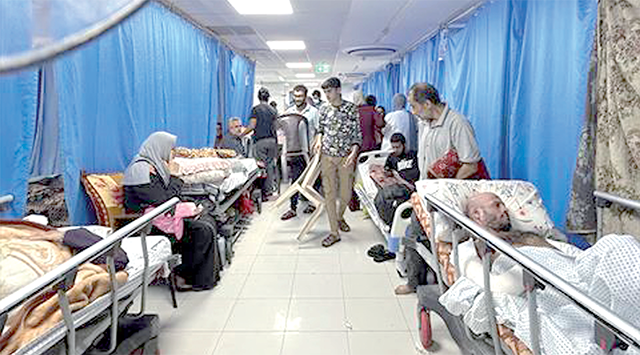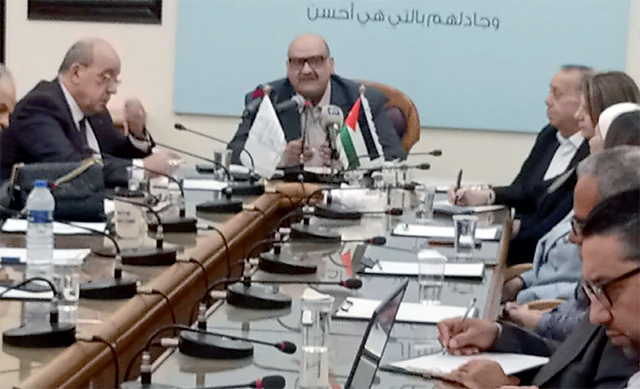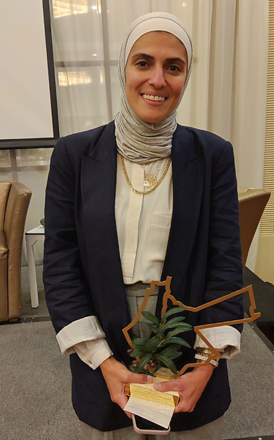You are here
Fuel, supply shortages worsen Gaza’s deepening healthcare crisis
By Rayya Al Muheisen - Nov 13,2023 - Last updated at Nov 13,2023

Patients and internally displaced people are pictured at Al Shifa hospital in Gaza City on Friday (AFP photo)
AMMAN — As the collapse of the healthcare system in Gaza intensifies with shortages of fuel and essential supplies, experts urge the international community to pressure Israel to adhere to international laws and prioritise the preservation of human life.
Dr Mohannad Alnsour, executive director of the Eastern Mediterranean Public Health Network (EMPHNET), warned of an impending catastrophe unfolding in Gaza.
“The toll of the recent 36-day Israeli military offensive is staggering, with 11,078 Palestinians, including 4,506 children, 3,027 women, and 678 elderly individuals losing their lives,” Nsoud told The Jordan Times.
Nsour underscored that a concerning 72 per cent of these casualties belong to the most vulnerable segments of the population.
Nsour added that fuel shortages, a direct consequence of the conflict, are compounding the crisis by incapacitating hospital generators.
“This jeopardises vital healthcare services, prompting an urgent plea for international intervention,” Nsour said. “Immediate action is crucial to prevent the collapse of the healthcare system, and the world must come together to ensure the preservation of human life in Gaza.”
Addressing misconceptions, Nsour clarified that bodies under rubble do not contribute to disease spread. However, he stresses the need for strict adherence to safety measures and proper water source management to prevent potential infections.
The psychological toll on the community is significant. Mass graves, while not a direct health risk, profoundly impact mental health.
Gaza’s women, constituting 49 per cent of the population, face a unique and urgent situation.
“The shortage of women’s health supplies increases the risk of various diseases due to compromised hygiene and the unavailability of essential resources,” Nsour said. Nsour highlighted that the targeting of a solar panels through deliberate shelling of hospitals signifies a clear intention to deprive hospitals of alternative energy, effectively transforming hospitals into graveyards.
“The Israeli aggression has so far disabled about 70 per cent of public healthcare centers across Gaza,” Nsour said.
By doing so, the occupation is targeting over 5,500 pregnant women waiting to give birth.
“Today, there is no place for pregnant mothers to give birth in Gaza, nor for babies to stay in incubators,” Nsour said.
Nsour went on to say that attacking power plants and water tanks clearly signals the beginning of the crime of genocide. Similarly, the repeated strikes on infrastructure and sewage networks represent an objective of wiping out the people of Gaza and making Gaza uninhabitable. The result is catastrophic, “Whether directly intended or by spreading epidemics and diseases while obstructing access to treatment”.
Nsour called for immediate cessation of war, bombing and deliberate targeting of the healthcare sector, and immediate permission for the entry of aid prioritising fuel for operational hospitals and the entry of international organisations and volunteers who can provide immediate services to affected populations.
“Immediate initiation of health and psychological support services, especially for children, women, and the elderly is a must in Gaza now,” Nsour said.
Safeguarding necessary water and sanitation infrastructure is also crucial, Nsour said.
Related Articles
AMMAN — The Amman Group for Future Dialogueshas issued a reporton the rapidly deteriorating humanitarian situation in the Gaza Strip.The rep
AMMAN — Making history by being the first Jordanian and Arab female doctor to enter Gaza, Asil Jallad assisted in delivering 500 babies duri
GAZA STRIP, Palestinian Territories — Israel faced mounting international pressure on Monday over the rising civilian death toll and destruc

Opinion
Apr 09, 2025
Apr 08, 2025
- Popular
- Rated
- Commented
Apr 08, 2025
Apr 09, 2025
Newsletter
Get top stories and blog posts emailed to you each day.
















